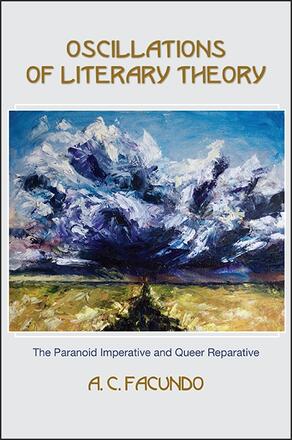
Oscillations of Literary Theory
The Paranoid Imperative and Queer Reparative
Alternative formats available from:
Revises key psychoanalytic concepts that influence interpretive practices in the humanities and formulates a new approach to reading fiction.
Description
Oscillations of Literary Theory offers a new psychoanalytic approach to reading literature queerly, one that implicates queer theory without depending on explicit representations of sex or queer identities. By focusing on desire and identifications, A. C. Facundo argues that readers can enjoy the text through a variety of rhythms between two (eroticized) positions: the paranoid imperative and queer reparative. Facundo examines the metaphor of rupture as central to the logic of critique, particularly the project to undo conventional formations of identity and power. To show how readers can rebuild their relational worlds after the rupture, Facundo looks to the themes of the desire for omniscience, the queer pleasure of the text, loss and letting go, and the vanishing points that structure thinking. Analyses of Nabokov's Lolita, Danielewski's House of Leaves, Findley's The Wars, and Ishiguro's Never Let Me Go are included, which model this new approach to reading.
A. C. Facundo is an independent scholar, who received a PhD in English from York University in Toronto and continued as a Social Sciences and Humanities Research Council postdoctoral fellow at the University at Buffalo, State University of New York.
Reviews
"Armed with a full repertoire of psychoanalytic resources, Facundo navigates the paranoid-reparative debate in literary studies with greater finesse than any critic I've read. Reframing current critical impasses, Oscillations of Literary Theory makes substantial contributions to narrative theory and aesthetics by illuminating their crucial connections with sexuality and pleasure. Facundo offers us here nothing less than a new method of reading queerly." — Tim Dean, University of Illinois, Urbana-Champaign
"This book seeks to understand hermeneutic imperatives and flights from these in terms of paranoid and reparative drives (as distinct from affect). It is a bold and ambitious project, but Facundo brings to it an exceptional array of skills. I am impressed by the author's close, subtle, and very canny readings of both theoretical and literary texts and by her demonstration of the complexity, variety, and centrality of ideas and operations of paranoia and the reparative in writings from Freud to the present. Oscillations revitalizes psychoanalytic criticism in its distinctly queer relation to psychoanalysis, a relation that yields surprising and refreshing insights." — Stephen M. Barber, coeditor of Regarding Sedgwick: Essays on Queer Culture and Critical Theory